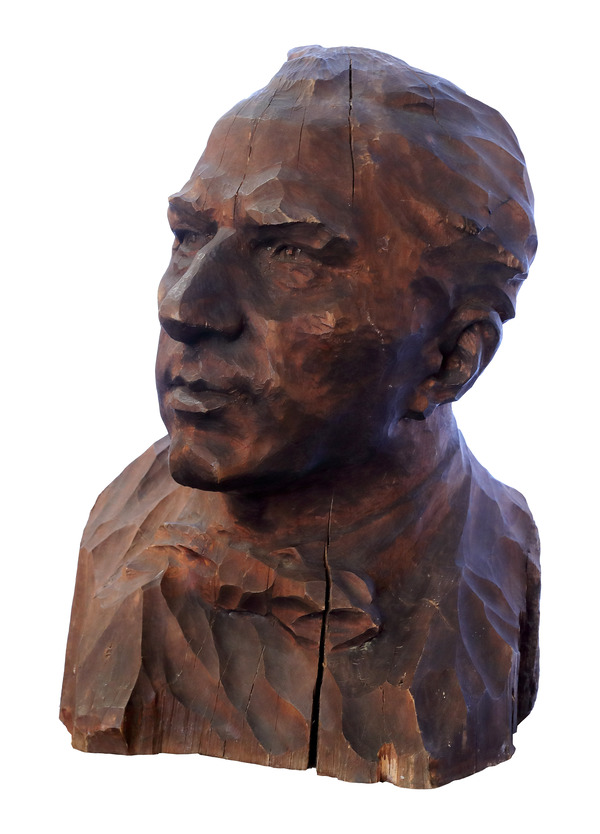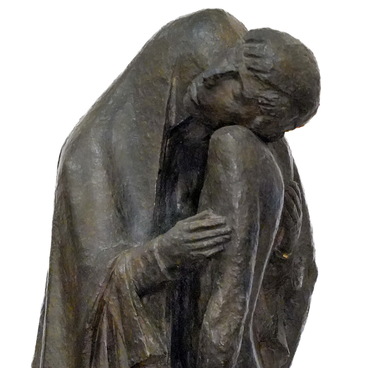The portrait of Mark Izrailevich Paverman, a famous Soviet and Russian conductor, was created by the Ural sculptor Vasily Ushakov in the late 1960s. The wooden bust portrait was made of linden. The sculpture includes the chest but not the shoulders. The surface was treated with broad and swift movements rather than even and smooth. This approach to the woodwork endowed the image with inner dynamics. With the use of a special carving technique, the sculptor also managed to enliven the eyes.
Mark Paverman was a Ural professor of music, conductor, musician, and People’s Artist of the RSFSR. He was born in Odessa, worked for various orchestras in Moscow, and in 1934 moved to Sverdlovsk. There he participated in the establishment of a symphony orchestra for the regional Radio Committee. When the Sverdlovsk Philharmonic was opened, Paverman’s musical group constituted a local orchestra. Paverman was its conductor for over thirty years.
After a short trip to Rostov-on-Don before the war, Paverman returned to his orchestra. Under his guidance, the ensemble of the Sverdlovsk Philharmonic Orchestra became one of the best in the country, enjoying guest appearances of the leading Soviet conductors and soloists, such as Grigory Ginzburg, Rosa Umanskaya, Natalia Gutman, and Mstislav Rostropovich.
The repertoire of the Paverman orchestra included many classical and modern works from Russia and other countries, including the outstanding symphonies by Beethoven and Tchaikovsky and Rachmaninoff’s most difficult pieces.
A large number of major works conducted by Paverman were performed in Sverdlovsk for the first time. He introduced the audience to the symphonies by Sergei Prokofiev, Dmitri Shostakovich, Aram Khachaturian, and others. The Philarmonic stage also welcomed almost everything ever created by Ural composers: some of the works were performed by Paverman for the first time.
Mark Paverman was one of the founders of the School of Opera and Symphony Conducting at the Ural Conservatoire and later became a professor there. Mark Paverman was awarded the state titles of Honored Artist of the RSFSR and People’s Artist of the RSFSR for his outstanding achievements. A music festival in memory of the conductor has been held in Yekaterinburg since 1998.
Mark Paverman was a Ural professor of music, conductor, musician, and People’s Artist of the RSFSR. He was born in Odessa, worked for various orchestras in Moscow, and in 1934 moved to Sverdlovsk. There he participated in the establishment of a symphony orchestra for the regional Radio Committee. When the Sverdlovsk Philharmonic was opened, Paverman’s musical group constituted a local orchestra. Paverman was its conductor for over thirty years.
After a short trip to Rostov-on-Don before the war, Paverman returned to his orchestra. Under his guidance, the ensemble of the Sverdlovsk Philharmonic Orchestra became one of the best in the country, enjoying guest appearances of the leading Soviet conductors and soloists, such as Grigory Ginzburg, Rosa Umanskaya, Natalia Gutman, and Mstislav Rostropovich.
The repertoire of the Paverman orchestra included many classical and modern works from Russia and other countries, including the outstanding symphonies by Beethoven and Tchaikovsky and Rachmaninoff’s most difficult pieces.
A large number of major works conducted by Paverman were performed in Sverdlovsk for the first time. He introduced the audience to the symphonies by Sergei Prokofiev, Dmitri Shostakovich, Aram Khachaturian, and others. The Philarmonic stage also welcomed almost everything ever created by Ural composers: some of the works were performed by Paverman for the first time.
Mark Paverman was one of the founders of the School of Opera and Symphony Conducting at the Ural Conservatoire and later became a professor there. Mark Paverman was awarded the state titles of Honored Artist of the RSFSR and People’s Artist of the RSFSR for his outstanding achievements. A music festival in memory of the conductor has been held in Yekaterinburg since 1998.



